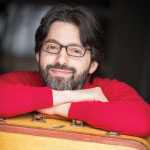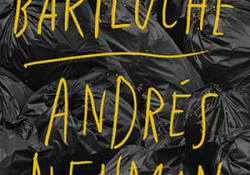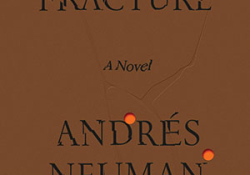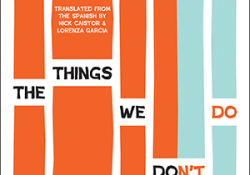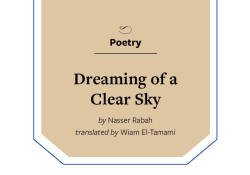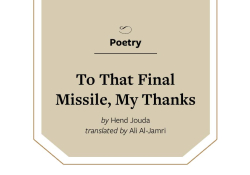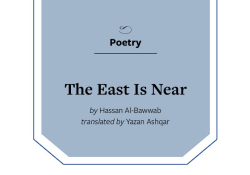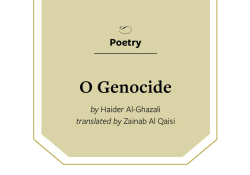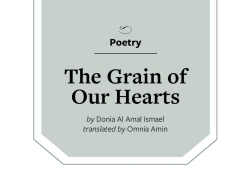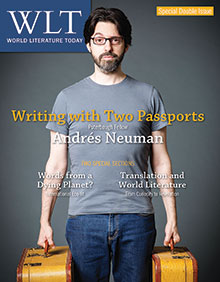Three Bilingual Poetry Readings by Andrés Neuman and George Henson
The Gardener
I learned to plant trees with my grandfather.
“The willows need
more water than you, Andrés,
and their roots
in the beginning aren’t
very deep.
Sometimes they grow so fast
and sometimes they stagnate in the earth,
afraid of the air.”
Today there’s no grandfather or country
or even that little boy. Only that curved
willow remains which – I tell myself –
Andrés, must be cared for,
these fragile roots,
this fear of the tallness of life.
El Jardinero
Aprendí con mi abuelo a plantar árboles.
«Los sauces necesitan
más agua, Andrés, que tú,
y sus raíces
al principio no son
demasiado profundas.
A veces crecen rápido
y otras veces se estancan en la tierra,
asustados del aire.»
Hoy no existe ni abuelo ni país
ni tampoco ese niño, pero queda
aquel sauce encorvado al que –me digo–
Andrés, hay que cuidar,
estas raíces frágiles,
este miedo a la altura de la vida.
The Trickle
Youth doesn’t end with age
but with the certainty of pain.
A young person isn’t soft skin
or infinite strength, rather someone
who feels intact inside,
someone whose hope
has less to do with effort than with a shiny vase.
Contrary certainty is not called experience.
It’s simply called dirt.
Death dirties and stains,
it muddies your summer shoe,
it captures your healthy heel,
it boasts of your immaculate leg.
Death is the starting trickle,
a tooth on the roof,
the craft of an early wolf.
When someone else’s death begins to become yours
the other life begins.
Another much shorter one.
And much more burdened with desire.
La gotera
La juventud no acaba con la edad
sino con la certeza de algún daño.
Un joven no es piel tierna
ni una fuerza infinita, sólo es alguien
que en el fondo de sí se siente intacto,
alguien cuya esperanza
tiene menos de esfuerzo que de jarrón brillante.
La certeza contraria no se llama experiencia.
Se llama simplemente suciedad.
La muerte ensucia, mancha,
enloda tu zapato de verano,
captura tu tobillo saludable,
presume de tu pierna inmaculada.
La muerte es la gotera inaugural,
es un diente en el techo,
el oficio del lobo prematuro.
Cuando la muerte ajena empieza a hacerse propia
empieza la otra vida.
Otra mucho más breve.
Y mucho más cargada de deseo.
Words to a Daughter I Don’t Have
I’ll half-close your eyes if you promise to dream me.
Please understand, it’s not easy to keep watch forever:
sometimes I need to know that you’re afraid.
When you learn to talk, give me my name;
you will have done enough just calling me papá.
In winter, don’t dress your princess body
too warmly; it’s more useful and noble
that you learn to endure.
Take candy from strangers
(these are not times for refusing)
but learn this as soon as you can:
bitterness and indifference
are more common than sweets.
I’ll teach you to read outside of school
and when the time comes I want you to write “sea”
on the tiles in the hall.
When you eventually cross the street alone
you’ll know that risk and speed
will chase your days forever.
Don’t think that in my heart I’m not an optimist:
if that were true you wouldn’t be there,
taking care that I care as I should.
As you can see, I distrust
anyone who doesn’t marvel at the wonder
of being here, now.
There is actually joy, but it hurts;
you’ll have to find it.
And when you do, you’ll be afraid.
Palabras a Una Hija Que No Tengo
Entornaré tus ojos si prometes soñarme.
Compréndeme, no es fácil velar por alguien siempre:
Cuando sepas hablar, dame mi nombre;
En invierno no abrigues demasiado
tu cuerpo de princesa, más útil y más noble
es irse acostumbrando a resistir.
Acepta golosinas de los desconocidos
pero apréndete esto en cuanto puedas:
más frecuente es lo amargo, que te ignoren,
y no los caramelos.
Te enseñaré a leer fuera del aula
y llegada la hora quiero que escribas «mar»
sobre los azulejos del pasillo.
Cuando cruces por fin la calle sola
sabrás que el riesgo y la velocidad
perseguirán tus días para siempre.
No creas que en el fondo no soy un optimista:
de lo contrario tú no estarías ahí
cuidando que te cuide como debo.
Como ves, desconfío
de quienes no veneran el asombro
de estar aquí, ahora.
Existe la alegría, pero duele;
tendrás que conseguirla.
Y cuando la consigas tendrás miedo.
Translations from the Spanish
By George Henson with the author
Editorial note: From El tobogán (2002), Mística abajo (2008), and No sé por qué (2011). English translations copyright © 2014 by George Henson.
